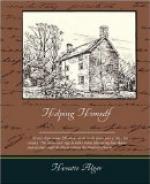“Finally we came to this place. It is a small place in Illinois. The people who live here are Mr. and Mrs. Barton and their son Abner. Mr. Joel Barton is a drunkard. He gets drunk whenever he has money to buy whisky. Mrs. Barton is a hard-working woman, and she does about all the work that is done. Mr. Ford paid her some money in advance. She is a tall woman, and her voice sounds like a man’s. She does not ill treat me, but I wish I were at home. Abner is a big, rough boy, a good deal older and larger than I am, but he is kind to me and he wants to come to New York. He says he will run away and take me with him, if we can get enough money to pay our fares. I don’t think we could walk it so far. Abner might, for he is a good deal stronger than I am, but I know I should get very tired.
“Now, dear papa, if you will send me money enough to pay for railroad tickets, Abner and I will start just as soon as we get it. I don’t know as he ought to run away from home, but he says his father and mother don’t care for him, and I don’t believe they do. His father doesn’t care for anything but whisky, and his mother is scolding him all the time. I don’t think she would do that if she cared much for him, do you?
“I have filled the paper, and must stop. Be sure to send the money to your loving son,
“Herbert Reynolds.”
“How easy you write!” said Abner, in wonder, as he saw Herbert’s letter growing long before his eyes. “It would take me a week to write as long a letter as that, and then I couldn’t do it.”
“I can’t write so easy generally,” said the little boy, “but, you see, I have a good deal to write about.”
“Then there’s another thing,” said Abner. “I shouldn’t know how to spell so many words. You must be an awful good scholar.”
“I always liked to study,” said Herbert. “Don’t you like to read and study?”
“No; I’d rather play ball or go fishin’, wouldn’t you?”
“I like to play part of the time, but I wouldn’t like to grow up ignorant.”
“I expect I’ll always be a know-nothin’, but I reckon I know as much as dad. The old man’s awful ignorant. He don’t care for nothin’ but whisky.”
“And I hope you won’t be like him in that, Abner.”
“No, I won’t. I wouldn’t like to have the boys flingin’ stones at me, as they did at dad once when he was tight. I licked a couple of ’em.”
Mrs. Estabrook read Herbert’s letter with intense interest. She saw that the little boy’s testimony would seriously incriminate Willis Ford, if he were recovered, as he would be if this letter came into his father’s hands.
“There’s only one thing to do,” the housekeeper reflected, closing her thin lips tightly.
She lit the gas jet in her chamber, and, without a trace of compunction, held the letter in the flame until it was thoroughly consumed.




